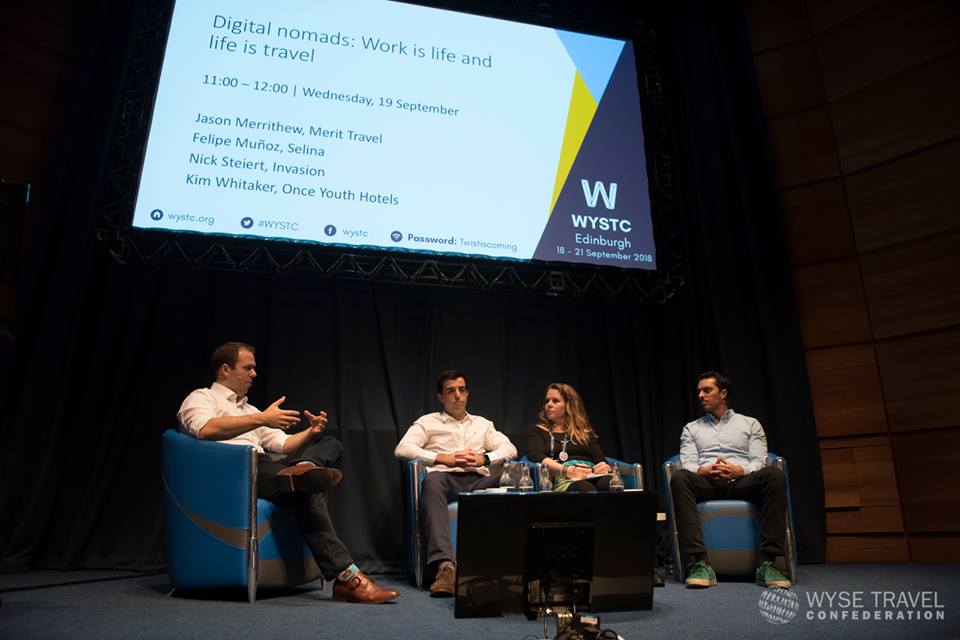Driven by cheap travel, freelance work, the internet, and the sharing economy, a new traveller is emerging: the digital nomad. Why should we care about digital nomads? This and other questions were raised at the 2018 World Youth and Student Travel Conference (WYSTC) during the session Digital nomads: Work is life and life is travel. The rise of and future prognosis for this new travel market combining life and work was discussed by Jason Merrithew (Merit Travel), Felipe Muñoz (Selina), Nick Steiert (Invasion) and Kim Whitaker (Once Youth Hotels) shared their thoughts on the mantra “work is life and life is travel”.
What defines a digital nomad?
According to Nick Steiert, it’s about taking your laptop anywhere in the world to work. For Felipe Muñoz, it’s about having an ecosystem of platforms. As Kim Whitaker explained, “young travellers today have a hoard of devices with them. With cafes now a place for young people to work and meet, setting up facilities with plugs, comfortable seating and fast internet must be considered.”
Who is a digital nomad?
According to the panellists, the digital nomad is a culture-seeker aged 18 to 35 undertaking a way of living and working that is location independent. A digital nomad is away from home, has different experiences compared to the traditional backpacker, and as he/she is working while travelling, has a greater disposable income.
What value can be placed on the digital nomad?
According to Felipe Muñoz, digital nomads are high-value customers. They are looking for new experiences, culture and adventure.
“If you have the right products for them, you will attract them. Services need to be reliable: internet connection, safe places, fun adventures and connectivity to local culture,” he said.
According to Kim Whitaker, travel bloggers are doing excursions during the day and work at night. They may work for a global company, but simultaneously freelance for the hostel they’re staying at, perhaps helping to build the hostel’s social media presence or communication strategy. While they may not stay long enough to have a significant impact, it allows local hostel staff to learn from international tourists about the latest digital practices and trends.
How should organisations manage digital nomads?
You cannot micromanage a digital nomad, according to Nick Steiert. He suggested that organisations should not tell a digital nomad how to do things; they simply need goals and guidance. They require a working culture of freedom, but that figuring out how this culture will work can be tricky. Should workers be able to work from anywhere? Absolutely. Can they work from other countries? Perhaps, but there needs to be a balance.
What can employers do to facilitate digital nomads?
According to Felipe Muñoz, 33% of millennials will quit their job within the next two years. Therefore, it is up to organisations to change employees’ minds before this occurs.
Is co-working the answer to a boring office environment? Cool office spaces are expensive, but Nick suggested that investment in co-working facilities helps to create a brand for the employer as a great place to work. Employers need to be “happiness managers” and it must come from the top.
For Kim Whitaker, a co-working desk space open to business owners creates great energy and allows their employees to see new people constantly coming through, exposing them to new ideas which come in to the business for free.
For Felipe Muñoz, co-working needs to be part of a bigger ecosystem allowing you to meet interesting people, be fun and enhance creativity. By providing the infrastructure, you allow digital nomads to visit places they were not able to visit before.
How can providers adapt to serve digital nomads?
Kim Whitaker suggested that we all just need to try it out for ourselves.
“Take your laptop and phone and find a place and see what you do and don’t like about it. Does it have power plugs? How many devices can it manage per person? How does it keep devices secure while you go and grab a coffee? Does it need to be an open space plan? Does it need a drinks bar? Are the chairs comfortable? Get feedback on what is working, and not working. Think about it as something that adds value to the consumer and learn from consumer needs to adapt,” she recommended.
Finally, is traditional office culture dead?
According to Nick Steiert, it’s not.
“There are people who still demand this, but co-working needs to be included as a viable option. The corporate mindset is still behind, but this will most definitely start to shift in the next three to five years,” he said.
For the aspiring digital nomad in all of us, we can simply wait and see or just try it out ourselves.

